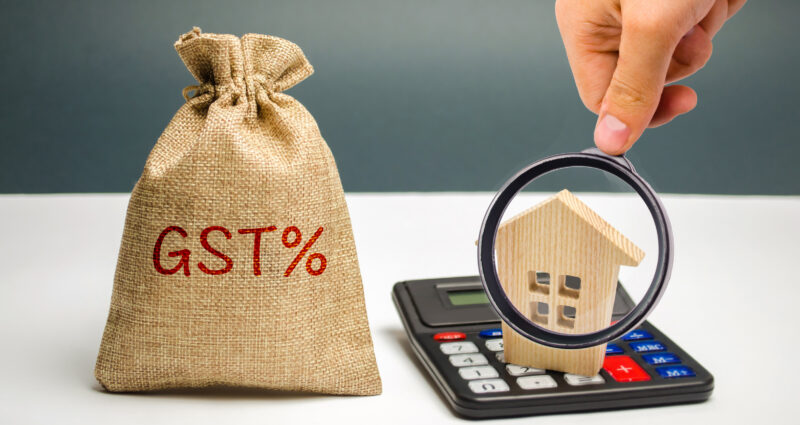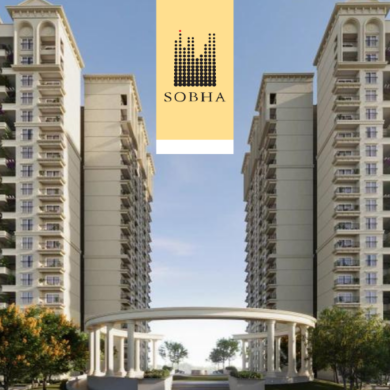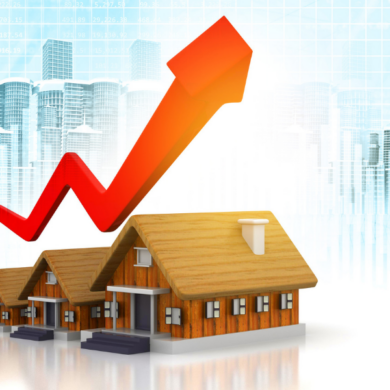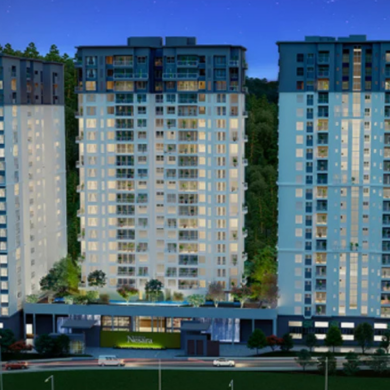GST Rate on Real Estate, Flat Purchase, Plot Sales – An Ultimate Guide
June 6th, 2024

Understanding the GST rates on real estate, flat purchases, and plot sales is crucial for buyers and investors. The GST rate on real estate varies: 5% for under-construction properties (1% for affordable housing), no GST on ready-to-move properties, and no GST on plot sales.
Abbreviated as GST, Goods and Services Tax is a single domestic indirect tax passed in the Parliament in March 2017 and in effect since 1 July 2017. This comprehensive and multi-stage tax is levied on the supply of goods and services on every value addition. The real estate market was significantly impacted by GST.
It subsumes many other taxes such as excise, service, and even VAT and ensures minimal cascading of taxes – thereby paving the way for an anti-inflationary approach. Homebuyers purchasing an under-construction apartment are liable to pay GST. Completed projects, i.e. those with completion certificate issued by a competent authority, are not liable to pay GST.
Table of Contents
GST on Flat Purchase 2024-25
Both real estate buyers and developers must pay Goods and Services Tax (GST). In India, homebuyers of under-construction flats, apartments, and bungalows pay 1% GST for affordable housing and 5% GST on non-affordable housing. However, completed projects are exempt from this tax.
Understanding Input Tax Credit (ITC)
Before delving deeper into GST, it is important to understand what an input tax credit (ITC) is. When you pay output tax, you can reduce the tax already paid on the input; this is termed as ITC. For example, if you are a manufacturer of goods and the tax on your final product (the output) is ₹500 and the tax paid on the purchases (the input) in making the final product is ₹300, then you can claim an input tax credit of ₹300, and pay only the remaining ₹200 as taxes. Manufacturers, suppliers, agents, aggregators, e-commerce operators, etc. registered under the GST Act are eligible to claim the input credit for tax paid on the purchases.
Claiming Input Tax Credit under GST
There are a few points to consider before claiming the ITC:
- Possession of Tax Invoice: You must possess the tax invoice of the purchase made or the debit note issued by the registered dealer.
- Receipt of Goods / Services: You should have received all the goods / services. If the goods are received in instalments, then the credit will be available against the tax invoice upon the receipt of the last lot or instalment.
- Tax Payment by Supplier: Tax on your purchases must be paid to the government by the supplier in cash or by claiming input credit.
- Filing GST Returns: GST returns must be filed by the supplier.
- Invoice Reflection in GSTR-2B: The supplier has uploaded the invoice in their GSTR-1, which must reflect in GSTR-2B of the recipient or buyer.
Updated GST rates as of 2024 confirm that the rates remain at 1% without ITC for affordable housing and 5% without ITC for non-affordable housing. These rates have been in effect since the 33rd GST council meeting in 2019, which aimed to simplify the taxation process for homebuyers and developers.
GST on Luxury Houses or Apartments
Under the new GST regime, homebuyers can save more now than before. The current GST rates allow consumers to buy luxury properties at a lesser price, with a 5% GST rate on non-affordable housing without the benefit of input tax credit (ITC).
| Luxury Housing | Before April 1, 2019 | After April 1, 2019 |
| Property cost per sq ft | ₹7,000 | ₹7,000 |
| GST rate on flat purchase | 12% | 5% |
| GST per sq ft | ₹840 | ₹350 |
| ITC benefit for a material cost of ₹13,000 at an average of 15% | ₹126 | NA |
| Total | ₹7714 | ₹7350 |
Luxury housing is defined as properties costing over ₹45 lakh and having a carpet area exceeding 90 square metres. According to the latest GST updates, the tax rate of 5% without ITC is still applicable for luxury housing segments. This ensures that while buyers benefit from a lower upfront GST rate, they cannot claim ITC on these transactions. This structure aims to simplify the tax process and reduce the cost burden on homebuyers in the luxury segment.
Understanding Affordable Housing Properties
A glance at the table below will detail the conditions of affordable housing properties. Also note that cities such as Chennai, Bangalore, Delhi NCR (restricted to Delhi, Noida, Greater Noida, Gurgaon, Ghaziabad, Faridabad), Kolkata, Hyderabad and Mumbai are metropolitan cities.
| Particulars | Conditions |
| Affordable Housing for metropolitan cities | 1. Residential house / flat having a carpet area of up to 60 sq m.
2. The gross amount charged cannot exceed ₹45 Lakhs. |
| Affordable Housing for non-metropolitan cities | 1. A residential house/flat having a carpet area of up to 90 sq m.
2. The gross amount charged cannot exceed ₹45 Lakhs. |
Conditions Governing 1% GST on Affordable Housing Properties
- No Input Tax Credit (ITC): Developers / promoters cannot claim ITC.
- Registered Purchases: At least 80% of the value of inputs and services must be purchased from registered persons. If not, tax at 18% on the shortfall must be paid on a reverse charge basis.
- Cement and Capital Goods: These must be purchased from registered persons. Otherwise, a tax of 28% on cement and applicable tax on capital goods must be paid on a reverse charge basis.
- Supply of Development Rights or FSI: Tax must be paid by the developer / promoter for the supply of construction services to the landlord.
- Electronic Cash Ledger: GST must be paid by debiting this ledger.
Source: (mint)
GST on Construction and Building Materials
GST applies comprehensively to the construction and real estate sector in India, covering various services and materials involved in the development process. Here is an updated overview:
- Under-Construction Properties (Credit-Linked Subsidy Scheme): Homes purchased under the Pradhan Mantri Awas Yojana (PMAY) Credit-Linked Subsidy Scheme (CLSS) attract a reduced GST rate of 1% without Input Tax Credit (ITC).
- Other Under-Construction Properties: For homes not under the CLSS, the applicable GST rate is 5% without ITC for residential properties and 18% with ITC for commercial properties.
- Works Contracts: GST rate for works contracts (where the contractor supplies both materials and labour) is 18%. However, if the contract includes a composite supply where goods constitute less than 25% of the total contract value, the rate is 18%. If goods constitute more than 25%, the rate is 12%.
Construction Materials
- Cement: Attracts a high GST rate of 28%
- Bricks: Subject to a GST rate of 12%
- Sand: Attracts a GST rate of 5%
Source: Goods & Service Tax, CBIC, Government of India: GST Goods and Services Rates
GST Applicability Based on Property Type
- Ready-to-Move (RTM) Properties: GST is not applicable as the sale of a building with a completion certificate is not considered a supply of goods or services under Schedule III of the CGST Act, 2017.
- Resale Properties: GST is not applicable as it is not considered a supply of goods or services.
- Land Purchase and Sale: Not applicable under Schedule III, as the sale of land is neither a supply of goods nor services.
Input Tax Credit (ITC)
- Availability: ITC can be availed on GST paid on inputs such as raw materials and services used in construction. However, it is not available for projects taxed at concessional rates like affordable housing (1% without ITC).
- Impact on Costs: The provision of ITC helps in reducing the overall cost of construction projects, which can result in lower prices for end consumers.
Taxes Before GST
During the indirect tax regime, the states and the Centre levied a series of indirect taxes. Every state had a different set of rules and regulations, and they collected taxes in the form of Value Added Tax (VAT). Central State Tax (CST) was applicable in the case of inter-state sale of goods. The states and the Centre levied indirect taxes such as the local tax, octroi and more. This led to a lot of overlapping of taxes, which was called the cascading effect of taxes.
The following is a list of all the indirect taxes before GST:
- Central Excise Duty
- Duties of Excise
- Additional Duties of Excise
- Additional Duties of Customs
- Special Additional Duty of Customs
- Cess
- State VAT
- Central Sales Tax
- Purchase Tax
- Luxury Tax
- Entry Tax
- Taxes on advertisements
All the above taxes have been replaced by the CGST, SGST, and the IGST. However, there is still a provision to avail GST for inter-state purchases at a concessional rate of 2% by utilising ‘Form C’. This applies to certain non-GST goods such as:
- Petroleum crude
- High-speed diesel
- Petrol
- Natural gas
- Aviation turbine fuel
- Alcoholic liquor for human consumption
GST on Maintenance Charges for Housing Societies
Housing societies with an annual turnover of less than ₹20 lakh are exempt from paying GST. 18% GST on residential properties is applicable if the flat owners pay at least ₹7500 as maintenance charges. For GST to be applicable, each member should be paying over ₹7500 every month as maintenance charges and the Residents’ Welfare Association should have an annual turnover of ₹20 lakhs.
If the maintenance charges exceed ₹7500, then 18% GST is taxable on the entire amount. RWAs can claim ITC on the tax paid by them on capital goods – such as water pumps, generators, lawn furniture, taps, pipes, sanitary fittings, and more.
GST on Rent
From 18th July 2022, tenants who lease residential units for business purposes are liable to pay 18% GST on the rent amount. This change was recommended by the 47th GST Council meeting. However, this is only applicable when the residential unit is rented by a GST-registered person or entity. The tenant is responsible for paying GST under the Reverse Charge Mechanism (RCM), allowing them to claim this amount as Input Tax Credit (ITC) against their GST liabilities on sales.
For private individuals renting residential properties for personal use, GST does not apply. Even if a business proprietor or partner rents a residence for personal use, they are exempt from this tax. GST registration is mandatory for service providers earning over ₹20 lakh annually and businesses with an income above ₹40 lakh per year. The threshold is lower at ₹10 lakh for those in northeastern and special category states.
This rule aims to bring uniformity but may impact the rental market, particularly corporate rentals and the co-living segment, as it increases the tax burden on businesses that rent residential properties for their employees or operations.
GST on Home Loan
GST does not apply to home loan repayment as far as the borrower is concerned. However, financial institutions offer several ‘services’ and these come under the purview of GST. Also, while availing a home loan, the banks will charge you GST on the processing, technical valuation, and legal fees.
Did you know this about GST?
- Residential projects with up to 15% commercial space are treated as residential properties under GST
- The effective GST on commercial property is 12%
- You do not have to pay any GST on the purchase of plots
- You do not have to pay any GST on buying a flat that is ready to move into
- Landlords do not have to pay GST unless the tenant is a business company
- GST does not subsume stamp duty or registration charges; you still must pay these duties while buying a property
- GST applies to the services that banks offer as part of the home loan, including processing fees, legal fees, etc
- GST has subsumed at least a dozen other taxes
- To factor in the GST cost, sellers increase the cost of ready-to-move-in properties
- Despite the applicability of GST, under-construction homes are usually cheaper than ready homes
Rate of GST on Developable Land
If you are investing in developable plots, then you can heave a sigh of relief as GST will not be applicable. As per the circular issued by the Central Bureau of Indirect Taxes and Customs on 3 Aug 2022, developable plots do not attract GST, even if basic infrastructure has been developed.
GST on Plots
The sale of plots does not attract GST generally. However, even a small construction on the plot could mean that one would have to pay GST. In such cases, one-third of the value of the plot will be excluded and GST will be levied on the remaining two-thirds value of the plot.
GST on Flat Registration
Flat registration does not attract GST, and will therefore not be paid at the time of registering the property. Property transactions in India continue to include stamp duty and registration charges.
Conclusion
Hailed as one of the biggest tax reforms of the country, the Goods and Services Tax (GST) has successfully subsumed many indirect taxes which were once imposed by the states and the Centre. This tax has been a boon to micro, small, and medium enterprises, and these MSMEs are now less dependent on tax experts when compared to the earlier regime. This one-nation-one-tax system is aimed at improving India’s competitiveness in the global markets, while leading to a reduction in costs of doing business.
FAQs
1. What is the current GST rate for under-construction flats in India?
The current GST rate for under-construction flats (apartments) in India is 5%. However, the developer may or may not be able to offer Input Tax Credit (ITC) which can reduce the effective GST you pay.
2. Is there any GST applicable on completed flats (ready to move) in India?
No, there is no GST applicable on completed flats (ready to move) in India, if they have received completion certificate from the competent authority.
3. What is the GST rate for plot sales in India?
There is no GST for plot sales in India, if there is no construction on the piece of land.
4. How does GST benefit affordable housing projects?
GST benefits affordable housing projects, as the Indian government offers a reduced rate of 1% for these properties. This can significantly reduce the overall cost for homebuyers.
5. What are the eligibility criteria for a property to be considered affordable housing?
The criteria for affordable housing can vary depending on the location. Generally, it involves factors like carpet area limitations, maximum sale price restrictions, and being located in specific zones.
6. What about stamp duty and registration charges? Are they related to GST?
No, stamp duty and registration charges are separate from GST. These are state-levied taxes applicable to property transactions.
7. Is it important to get a GST invoice for my property purchase?
Yes, it is important to get a GST invoice for your property purchase. This serves as a valid document for tax purposes and future reference.
8. What if I have a specific question about the GST rate applicable to my property deal?
If you have a specific question about the GST rate applicable to your property deal, it is advisable to consult a tax professional who can analyse the details and provide tailored advice.
9. Is GST applicable on the purchase of a ready-to-move-in flat?
No, GST is not applicable on the purchase of a ready-to-move-in flat.
10. Who is responsible for paying the GST on flat purchases?
Homebuyers or investors are responsible for paying the GST on flat purchases, if they are under construction.
11. What is the current GST rate on a flat purchase?
The current GST rate on a flat purchase for residential properties without ITC is 5% and 1% for affordable housing without ITC. GST is applicable on under-construction flats, not on ready-to-move-in ones.
12. What are the three different types of GST?
The three different types of GST are Central Goods and Services Tax (CGST), State Goods and Services Tax (SGST) or Union Territory Goods and Services Tax (UTGST), and Integrated Goods and Services Tax (IGST).
13. Is real estate subject to GST?
Yes, real estate is subject to GST, but only in case of under-construction properties that have not received an Occupancy Certificate (OC).
14. How do you calculate GST on a flat in 2024?
You can calculate GST on a flat in 2024 using the following formula. For under-construction properties, a GST of 12% is applicable with ITC and 5% without ITC. For under-construction properties in affordable housing, a GST of 8% is applicable with ITC and 1% without ITC. Completed projects do not come under the purview of GST.
15. Who pays GST builder or buyer?
The homebuyer pays GST for under-construction properties.
16. How do I claim a GST refund on a flat?
You can claim a GST refund on a flat if it is under construction, by submitting an application to the GST authorities along with amount of tax paid and GSTIN of the property developer.
17. How can I avoid paying GST on my property?
GST does not apply to ready-to-move-in flats.
18. Is GST refundable on the cancellation of the flat?
Yes, GST is refundable on the cancellation of the flat, if it is under construction and the builder has already paid GST to the government. To do this, send an application to the GST Council seeking a refund since your booking is cancelled. The booking amount must be refunded by the builder after deducting the agreed-upon penalty charges, if any.
19. Is GST applicable on the sale of an old flat?
No, GST is not applicable on the sale of an old flat. Since an old flat will have an Occupancy Certificate and is considered a ready-to-move-in flat, it does not come under the purview of GST.







